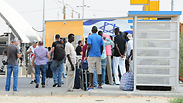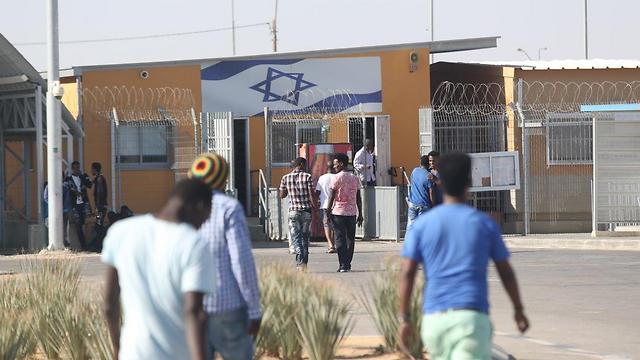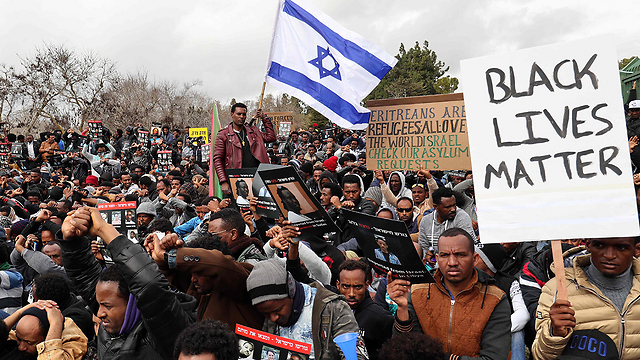
Knesset approves Holot detention center closure
The Holot detention facility, which houses African illegal immigrants and asylum seekers, is expected to be closed in three months, with Sudanese and Eritreans given two options: either be imprisoned in the Saharonim Prison or deported to Rwanda.
The Knesset approved a bill proposal to close the Holot detention facility, which houses African illegal immigrants and asylum seekers, in a second and third reading late Monday.
The legislation extends the temporary order keeping the Holot facility open by only three months in an effort to encourage "voluntary departure" with intentions being to close down the facility completely within four months.
The illegal immigrants and asylum seekers from Eritrea and Sudan will face two options: either be imprisoned in the Saharonim Prison or deported to Rwanda under an agreement the African country signed with the State of Israel.
The proposal by Interior Minister Aryeh Deri and Public Security Minister Gilad Erdan includes a plan to gradually close the facility within a few months, provided that the agreement signed with Rwanda goes ahead as planned.
The agreement had been amended to allow Israel to deport illegal migrants to Rwanda even without their consent following an August ruling by the High Court of Justice, which determined the State of Israel cannot detain illegal immigrants and asylum seekers who refuse "voluntary departure" for more than 60 days if the agreement with the third party does not allow forced deportation.
Israel will now encourage illegal migrants to leave for Rwanda or other countries en masse. If it is not possible to deport the illegal migrants directly to a third country, the closure of the Holot facility will be reexamined in three months.
According to the bill proposal, over a period of more than a decade, more than 60,000 people have been caught after having entered Israel illegally. At present, there are some 40,000 Eritrean and Sudanese nationals staying illegally in Israel who are currently protected by the temporary non-refoulement principle.
"Such a population staying (in Israel) illegally leads to many negative consequences—social, economic and others," the bill proposal notes.
The legislation approved by the Knesset also amends the definition of "infiltrator" to allow for increased enforcement against employers who hire illegal migrants.
Some members of Zionist Union raised objections to the fact the party leadership decided to vote in favor of the legislation. Eventually, party leader Avi Gabbay relented to requests to allow each MK to vote as he or she sees fit.
"The government speaks on behalf of the residents of south Tel Aviv, but in reality it abandons them," MK Dov Khenin (Joint List) said during the Knesset discussion on the bill.
According to Khenin, the legislation "symbolizes one of the greatest failures of the Netanyahu government. There, in the desert, this government buried NIS 1.5 billion in building the Holot facility, which is unnecessary, problematic, irrelevant, and harmful, and anyway it is now being closed. Instead of solving the problems in south Tel Aviv, instead of creating real solutions in the form of rehabilitating neighborhoods and providing aid, assistance and investments, instead of investing in a solution to the distress of the asylum seekers from Africa—this government does only one thing: inciting one against the other."












